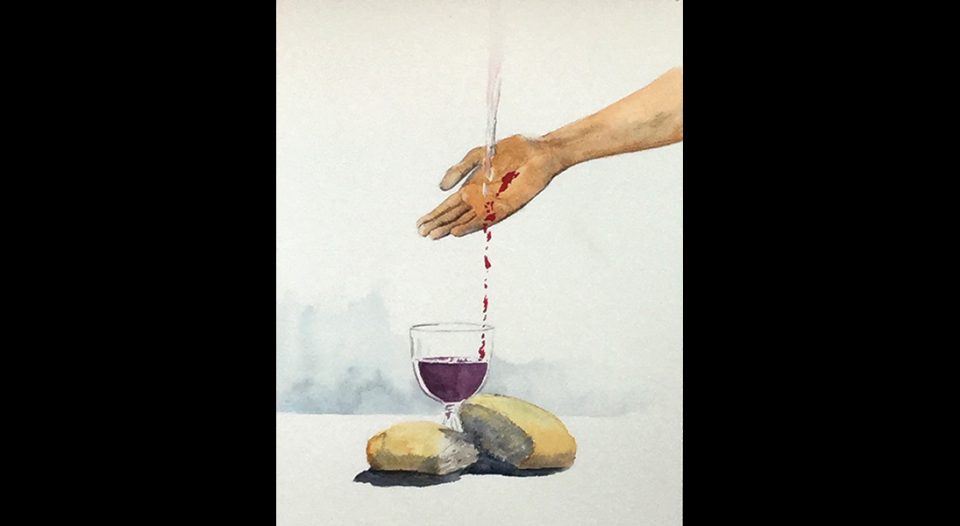Editor’s note: As Lutherans, grace is at the heart of our faith understanding. But what does it look like to actually live out grace? In this three-part series, we will explore what grace means and what it looks like to tangibly experience grace in action.
Joseph Castañeda Carrera first sensed a call to ministry as a teen, but as a gay man of color, he found no ready place in the church. For a time, he gave up on faith altogether. “I would rather believe God didn’t exist than that God was cruel—to give [me] this call and then not allow me to be able to follow it,” he said.
Then Carrera talked with an ELCA pastor. “It was the first time I heard someone speaking about God in a way I felt God existed, instead of another God I didn’t understand or recognize … and she affirmed my sense of call,” he recalled.
These were the first steps in a journey that would lead Carrera to become pastor of two Los Angeles ELCA ministries and Reconciling in Christ (RIC) communities: Hollywood Lutheran Church and ADORE LA, a self-described “queer community of faith.”
The RIC program is a primary ministry of the Lutheran organization ReconcilingWorks, which has worked since 1974 for “the full welcome, inclusion and equity of lesbian, gay, bisexual, transgender and queer (LGBTQ) Lutherans in all aspects of the life of their church, congregations and community,” according to the nonprofit.
ReconcilingWorks’ executive director, Aubrey Thonvold, is a lifelong Lutheran from rural Minnesota, who, as an adolescent, “didn’t really have language or words” for what she knew to be true about her sexuality. When she saw a same-sex couple for the first time, she said, “I remember the peace that came; my heart clicked into place to see a reflection of myself in others.”
Alongside the RIC program, ReconcilingWorks offers educational materials and inclusive church trainings for congregations, synods and churchwide ministries in the ELCA and Evangelical Lutheran Church in Canada. Its strategy is “graceful engagement,” an effort to meet people where they are and to accompany them in conversation and discernment toward justice.
“I don’t think anybody at ADORE tries to own God’s grace. [Grace] passes through us on the way to others, and we welcome others out of the understanding that it is inextricably connected to God’s own welcome for us.”
Grace is central to its mission: “We are responding to the biblical promise that God is making us new. We believe God has named and claimed all as beloved, with a diversity of gifts, and that we are called to justice,” Thonvold said.
“Grace passes through us on the way to others”
“Queer people have always been loved by God but have not always heard those messages in God’s churches,” Carrera said.
Many Lutherans might assume that this has changed in the ELCA—that the church’s welcome to LGBTQ people is apparent, or that a statement proclaiming “all are welcome” is sufficient to get the message across. But Thonvold said the RIC designation still matters: “In 2017, violence against LGBTQIA+ people rose 86 percent, and the murder rate of [transgender] women of color has doubled.”
Because sexuality is not a federally protected status, LGBTQ people can still be fired for their sexuality or gender in many states. “There is a need [for the church] to declare boldly and prophetically that LGBTQ people are loved and welcomed,” she argued, because by and large, “the rest of the world doesn’t welcome us.”
For Carrera, the essence of grace in the face of such unacceptance is “taking the time to see each other, to say, ‘Yes, you! God loves you. You are valued.’ ”
Having experienced grace in action, Carrera is moved to share it with others. “I don’t come to ministry as a pastor with any illusions that I can share God with people any better than they can share God with me,” he said.
Worship at ADORE LA includes in-person and online gatherings, such as weekly “Made by Prayer” services held through livestreamed, interactive video sessions online. The community gathers in unconventional ways as a means of inclusivity and welcoming people as themselves.
“I don’t think anybody at ADORE tries to own God’s grace,” Carrera said. “[Grace] passes through us on the way to others, and we welcome others out of the understanding that it is inextricably connected to God’s own welcome for us.”
Grace also means behaving as if God’s future promises are already true, even when it feels “as though you’re dancing a beautiful dance to a song that will be written tomorrow,” he said.
Dancing toward the future is grace too: sending people out “to serve as a beacon of hope to others who need to hear the song. And you are the song,” he added.
Next: In March, this series will highlight Lutheran prison ministry and the ways in which grace is a foundational aspect of such work.




